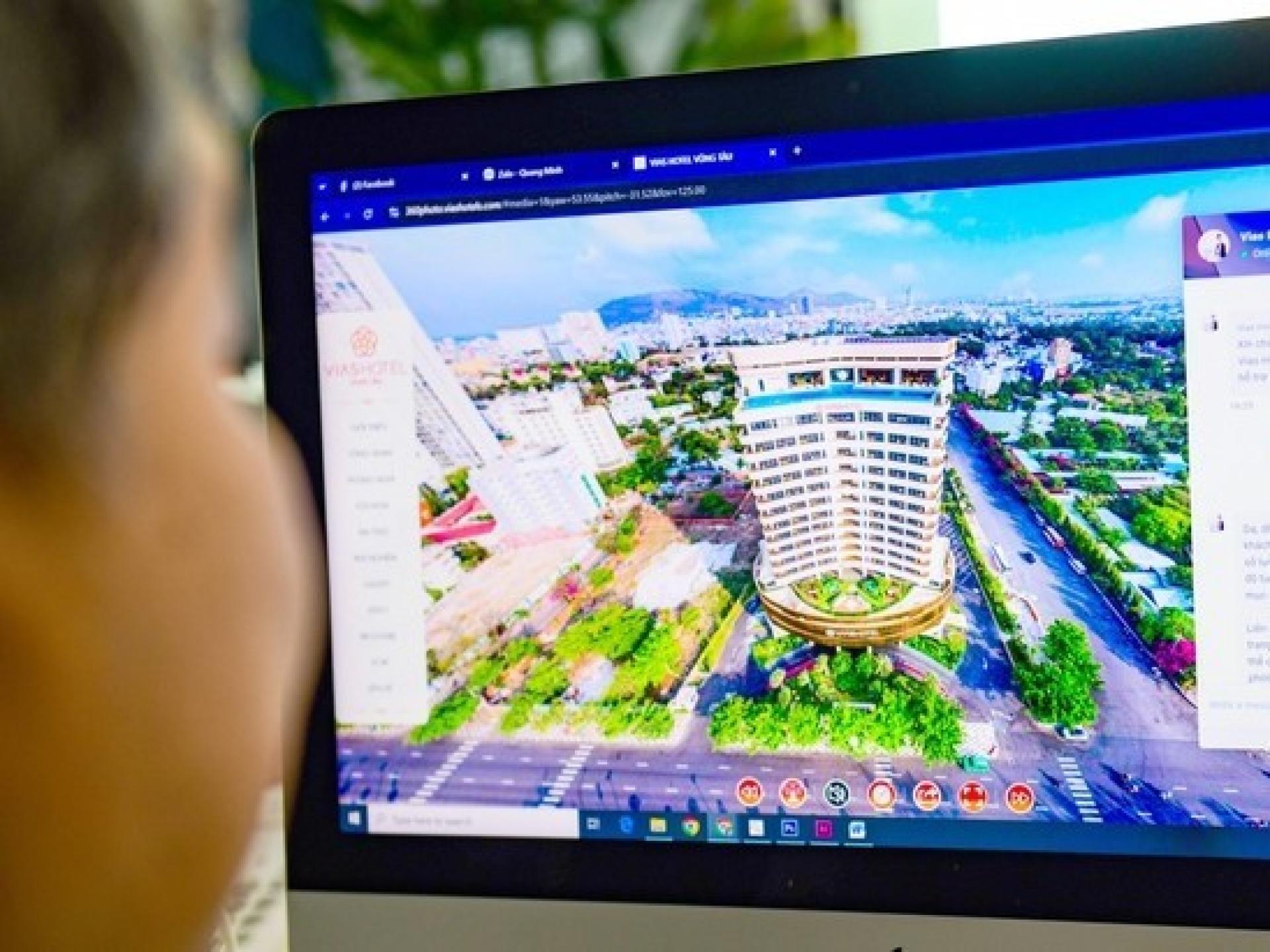(Hanoi, 4th)—Artificial Intelligence (AI) is rapidly permeating Vietnam’s tourism industry, covering areas such as advertising placement, customer analysis, online booking, video creation, pricing management, and itinerary recommendations. This is offering tourism businesses new opportunities to reduce costs and increase efficiency. While service efficiency and customer satisfaction have improved, traditional positions are also under threat.
Hoang Phan Phuong Hoang, Deputy General Manager of Viettour Company, revealed that the company has extensively applied AI to core operations like advertising and marketing, customer data analysis, and online travel consultation. “The results have been remarkable. Not only has the conversion rate increased and operational costs decreased, but the customer experience has also improved significantly.”
The accommodation sector is also actively transforming. Nguyen Thi Khanh Ha, Marketing Director of Vias Vung Tau Hotel, pointed out that the key to attracting guests to choose a hotel is the “first impression.” The hotel uses 360-degree panoramic imaging technology, allowing guests to thoroughly understand room types and services online, thus shortening decision-making time.
Nguyen Thi Mai, a hotel operator in Da Nang focusing on central Vietnamese cuisine, shared that since introducing AI to assist with content creation, promotional costs during major holidays have dropped significantly. “In the past, we needed to hire a professional team to shoot promotional videos, but now we can automatically generate high-quality short videos in just a few minutes.”
She also pointed out that AI is used in hotel operations management, including automatic quoting, guest flow forecasting, and dynamic room pricing. Since the end of 2024, the hotel has reduced its staff by about 30%.
It is reported that in cities such as Ho Chi Minh City, Quang Ninh, Hue, and Da Nang, many tourism bureaus and enterprises have launched “smart tourism” applications integrated with AI, which can provide personalized recommendations for attractions, dining, and accommodation based on tourists’ search habits.
The Vietnam Tourism Association predicts that by 2025, the tourism industry will enter a new phase where “technology + service standards” are equally emphasized. Only by actively transforming can businesses seize emerging markets. Hoang Phan Phuong Hoang suggests that tourism enterprises should focus on three core areas: “comprehensive digital transformation, personalized customer experience, and collaborative technological innovation” to build a competitive intelligent service system.
Nguyen Thuy Duong, Tourism and Hospitality Management Consultant at British University Vietnam, emphasized that enterprises should make good use of big data collected by AI to gain insight into customer preferences. “Designing tourism products that are more market-oriented based on behavioral data is the only way to truly achieve precise service.”
According to McKinsey research, generative AI brings an annual potential value of 2 to 4 trillion US dollars to the global economy, with tourism being one of the sectors benefitting significantly. The market expects that the global tourism AI market will leap from $92.46 billion in 2023 to $397 billion in 2028, with a compound annual growth rate of 33.9%.
According to a Booking.com survey, 50% of Vietnamese respondents trust AI’s ability to recommend travel destinations, and 67% are more willing to plan their trips via AI.
Thus, it can be seen that AI is gradually becoming a “gold mine” for the global tourism industry, and whoever seizes this technological dividend first will determine their competitive position in the new era.
The accommodation sector is also actively transforming. Nguyen Thi Khanh Ha, Marketing Director of Vias Vung Tau Hotel, pointed out that the key to attracting guests to choose a hotel is the “first impression.” The hotel uses 360-degree panoramic imaging technology, allowing guests to thoroughly understand room types and services online, thus shortening decision-making time.
Nguyen Thi Mai, a hotel operator in Da Nang focusing on central Vietnamese cuisine, shared that since introducing AI to assist with content creation, promotional costs during major holidays have dropped significantly. “In the past, we needed to hire a professional team to shoot promotional videos, but now we can automatically generate high-quality short videos in just a few minutes.”
She also pointed out that AI is used in hotel operations management, including automatic quoting, guest flow forecasting, and dynamic room pricing. Since the end of 2024, the hotel has reduced its staff by about 30%.
It is reported that in cities such as Ho Chi Minh City, Quang Ninh, Hue, and Da Nang, many tourism bureaus and enterprises have launched “smart tourism” applications integrated with AI, which can provide personalized recommendations for attractions, dining, and accommodation based on tourists’ search habits.
The Vietnam Tourism Association predicts that by 2025, the tourism industry will enter a new phase where “technology + service standards” are equally emphasized. Only by actively transforming can businesses seize emerging markets. Hoang Phan Phuong Hoang suggests that tourism enterprises should focus on three core areas: “comprehensive digital transformation, personalized customer experience, and collaborative technological innovation” to build a competitive intelligent service system.
Nguyen Thuy Duong, Tourism and Hospitality Management Consultant at British University Vietnam, emphasized that enterprises should make good use of big data collected by AI to gain insight into customer preferences. “Designing tourism products that are more market-oriented based on behavioral data is the only way to truly achieve precise service.”
According to McKinsey research, generative AI brings an annual potential value of 2 to 4 trillion US dollars to the global economy, with tourism being one of the sectors benefitting significantly. The market expects that the global tourism AI market will leap from $92.46 billion in 2023 to $397 billion in 2028, with a compound annual growth rate of 33.9%.
According to a Booking.com survey, 50% of Vietnamese respondents trust AI’s ability to recommend travel destinations, and 67% are more willing to plan their trips via AI.
Thus, it can be seen that AI is gradually becoming a “gold mine” for the global tourism industry, and whoever seizes this technological dividend first will determine their competitive position in the new era.
